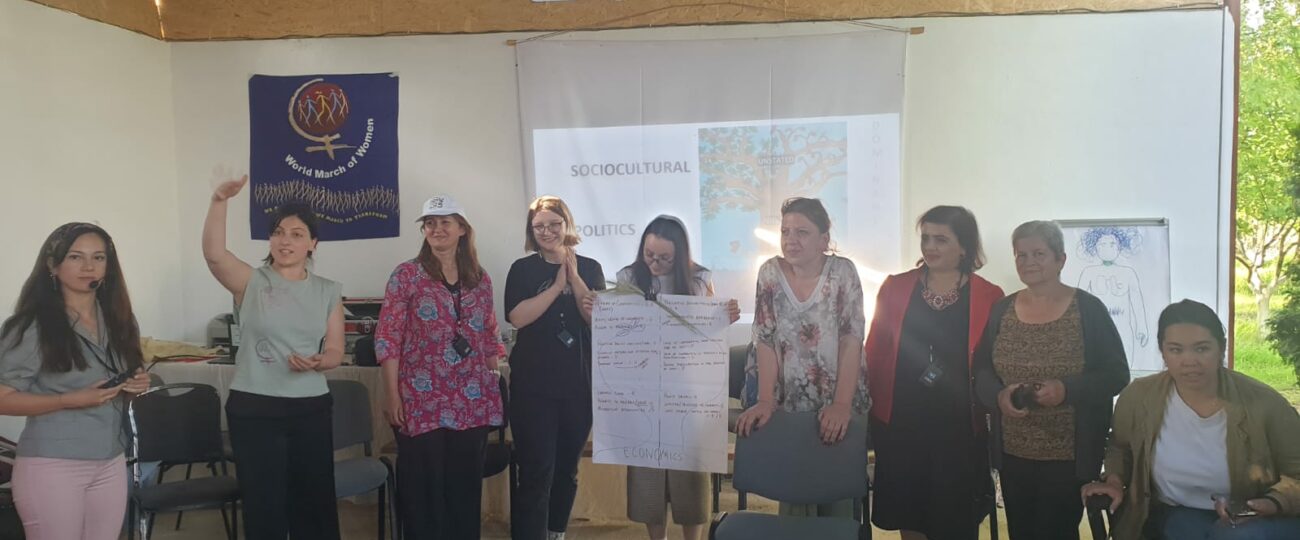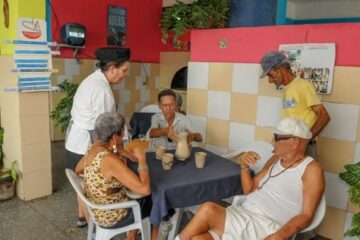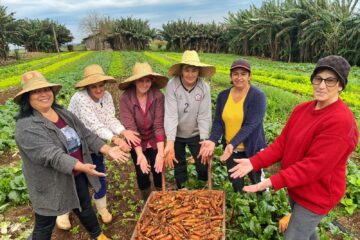The feminist movement in Georgia has made significant progress over the past 15 years, including decreasing gender-based violence, changing discriminatory laws, and increasing political representation. However, in Georgia today, women are facing many severe political, social, and economic challenges.
Femicide, the murdering of women based on their gender, is one of Georgia’s most serious problems, with statistics increasing every year. Although legal mechanisms have emerged in the country, human rights defenders demand that the term ‘femicide’ be included in the law. This forces the state to recognize that femicide is a particularly serious crime, but it is also a social phenomenon caused by the perception that a woman is a man’s property and that a man can control a woman’s life.
The fundamental cause for the rise in femicide in Georgia in the last years is that nothing is being done to prevent it. Legislative changes are primarily focused on punishment, and therefore the State does not have a policy with a systematic approach to the issue. That approach entails recognizing and studying the causes of femicide, understanding the problem from multiple perspectives, and including State institutions, civil society, and the media in the prevention process.
To continue discussing the need for legislation changes, the Georgian feminist movement has been demanding for several years to change the “rape law”. Georgia ratified the Istanbul Convention in 2017, and according to the Convention, it is required to revise the law on rape. Currently, the law says that rape is “sexual intercourse with violence, the threat of violence and the use of power over the victim.” A sexual act without consent should be regarded as rape, and the law should emphasize that the absence of consent, not violence or threats, is the crucial aspect of rape. Every year, a women’s march is organized to call for a strengthening of the law that will enable women to better protect their rights.
Lack of informed electoral choices (women voters, their needs and challenges)
Poverty, Gender Inequality Index (GII), asset ownership (economic empowerment). Despite empowering women, their economic rights face challenges in different directions. Asset ownership is still a problem with mentality in the rural areas and women face inequality while getting the property on the ground of inheritance. The law guarantees ownership and inheritance, but the reality is absolutely different. Mostly property is registered on male’s name, even in case of marriage. A rare number of cases related to co-ownership are registered. That causes the economic dependence on men by women.
Agriculture remains a priority sector for Georgia in terms of its contribution to gross domestic product (GDP) and economic growth. More than 40% of Georgia’s population live in rural areas and 75% of the rural population is self-employed, largely in the agricultural sector. Some 59% of self-employed women involved in small family farming are unpaid. Women are more involved in low-income activities than men, such as subsistence agriculture. As their work is associated with family responsibilities, it remains largely unpaid. Moreover, women employed in all agricultural sectors are paid less than men.
Women have limited access to resources, such as land. Data on the documented ownership on agricultural land shows that 12.6% of documented land owners are women and 30.6% are men. Reported but undocumented data indicates that the figures are 34.1% and 47.7%, respectively. Due to their lack of registered land, women have limited access to credit, grant schemes and government subsidies. Compared to men, women also have less access to information, modern technologies and agricultural resources. Access to credit is problematic, although there are no formal legal barriers that prevent women from obtaining access to credit. However, loans are actually less accessible to women because many women do not own land or property that can serve as collateral. Special concessional programs implemented by banks, microfinance institutions (MFIs) and international organizations rarely target the most impoverished men or women, or start-up initiatives. Furthermore, these initiatives rarely take into account the specificities of the agricultural sector.
Access to microfinance products is limited for ethnic minority women due to linguistic and cultural barriers, as well as for internally displaced persons (IDPs) and conflict-affected women due to the absence of collateral. The share of women among newly-established enterprise owners has remained stable in recent years. The major challenges that women face when embarking on entrepreneurial ventures are related to the lack of access to financial and other types of resources.
Another big issue is patriarchal attitude and stereotypes. Women’s roles, opportunities and rights in Georgia are often constrained by conservative sociocultural norms and gender stereotypes. These issues are most prevalent in rural and remote areas, particularly among ethnic minorities. However, they also affect women in urban areas. There is a widespread and largely unquestioned acceptance of conservative gender roles in the country. The reproduction of stereotypes through the media and educational materials, as well as a lack of awareness of gender inequality among the general public, contribute to the further entrenchment of these ideas. Gender norms are also reproduced through implicit and unquestioned assumptions that may be transferred by teachers and others who influence people’s thought and behavior.
Even in non-crisis situations, care responsibilities fall heavily on women, as noted above. In the context of the pandemic, the increased demand for care work deepened existing gender
inequalities in the division of household chores. Women reported spending more time on domestic activities than men during the pandemic, and less time spent on leisure activities. Correspondingly, men are more likely to report an increase in leisure activities than women. Tasks related to child care appear to have been most affected by the pandemic, as the time dedicated to instructing, teaching and training children, or playing with them, has increased.
The feminist movement and the World March of Women
There are women’s movements mostly working on cases on inequality and gender violence, but few works on economic rights. The Balkan Feminist Organizing School in Cappadocia last year, inspired us to share the information and experience through the network of the WMW. Part of the projects inside the organization are supporting women to be empowered, to get qualified consultations. The World March of Women Georgian national coordination body was created last year to spread the voices from Georgian women to the decision-makers and international organizations, to share international experience and support local initiatives from women, especially in the rural areas.
We are supporting women through different programs, working on gender sensitization issues with municipalities, working active on women’s rights struggles, both with the women, to empower them with knowledge, and also with the government, pushing for more public policies and laws. One of the projects embraced by the WMW is called “Agroecology & Women”, where we research the role of women in rural areas, work with the restoration of traditional animal species and creation of mini seed banks; another project we are working on is dedicated to biodiversity sustainable management, improving legal framework and women empowerment in vulnerable ecosystems and rural communities.
Being a member of this powerful network such as the WMW is very important in this process because of the support and solidarity that comes from the sisters from around the world. By sharing experiences and knowledge related to problem-solving and our feminist agenda, we can learn from international experiences and put them in place here.
The network practices and support is important as women in Georgia still face discrimination in economic and social life. In terms of labour relations, women are concentrated in sectors that leave them vulnerable and involve unequal employment conditions. That’s why supporting feminism economy and empowerment of women together with international experiences and through different platforms are crucial for condemning poverty and creation of proper conditions for gender equality in Georgia.

This article was written collectively by Marika Kapanadze, Ana Muradashvili and Nino Rostomashvili. They are members of the recently build National Coordination Body of the World March of Women in Georgia.




